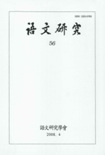- 영문명
- A Study of Works about Women Written in Seventeenth Century
- 발행기관
- 어문연구학회
- 저자명
- 김명순(Myung-soon Kim)
- 간행물 정보
- 『어문연구』語文硏究 第56輯, 117~139쪽, 전체 23쪽
- 주제분류
- 어문학 > 한국어와문학
- 파일형태
- 발행일자
- 2008.04.30

국문 초록
영문 초록
This article analyzes three forms of writings dedicated to the dead women, such as records of deceased persons"s lives(行狀), funeral orations (祭文), and epitaphs(墓誌銘), written by male authors in the seventeenth century.
This article also tries to illuminate both how men expressed their emotions toward women and how women"s lives of that time, which are rarely known to us, were revealed in those writings.
Those three kinds of writings, written in prose forms with due formality and reminiscent of dead women, more specifically, dead mothers, wives, daughters-in-law, and daughters, not only express their sufferings of loss, loves, and regrets, but also functions as means of revelation of how women"s real lives were during that time.
Those lives revived through male authors" memory in their own ways show there existed two kinds of lives for the seventeenth-century women.
First, there were lives of subordination to men. Second, there were lives of their own. In the lives of subordination, women were to live the lives of so-called "good women", or "good housekeepers" as mothers, wives, daughters-in-law, or daughters according as the male-dominated society forced them too.
On the other hand, ironic enough, under these living conditions in the second lives, women lived or, at least, tried to live "full" as active, "living" entities.
For this study, the following works were selected and analyzed. First, for records of deceased persons"s lives, man-jung Kim"s Yoonsihaengjang and sac-back Lee"s Kimsihangjang, and for funeral orations, rome works by si-yeul Song and su-hang Kim were selected and analyzed.
The reasons why man-jung kim"s work was selected for records of person"s is man-jung kim"s work is included in school"s textbooks and so widely known to and is still being read by readers. sac-back lee"s work was selected in order to understand emotional attitudes commonly shared by the contemporaries of the author.
For funeral orations, much consideration was taken into si-yuel song"s work, because of the fact that he was the typical orthodox Confucian scholar in the seventeenth century and he coauthored with his wife, daughter, and daughter-in-law.
This article also tries to illuminate both how men expressed their emotions toward women and how women"s lives of that time, which are rarely known to us, were revealed in those writings.
Those three kinds of writings, written in prose forms with due formality and reminiscent of dead women, more specifically, dead mothers, wives, daughters-in-law, and daughters, not only express their sufferings of loss, loves, and regrets, but also functions as means of revelation of how women"s real lives were during that time.
Those lives revived through male authors" memory in their own ways show there existed two kinds of lives for the seventeenth-century women.
First, there were lives of subordination to men. Second, there were lives of their own. In the lives of subordination, women were to live the lives of so-called "good women", or "good housekeepers" as mothers, wives, daughters-in-law, or daughters according as the male-dominated society forced them too.
On the other hand, ironic enough, under these living conditions in the second lives, women lived or, at least, tried to live "full" as active, "living" entities.
For this study, the following works were selected and analyzed. First, for records of deceased persons"s lives, man-jung Kim"s Yoonsihaengjang and sac-back Lee"s Kimsihangjang, and for funeral orations, rome works by si-yeul Song and su-hang Kim were selected and analyzed.
The reasons why man-jung kim"s work was selected for records of person"s is man-jung kim"s work is included in school"s textbooks and so widely known to and is still being read by readers. sac-back lee"s work was selected in order to understand emotional attitudes commonly shared by the contemporaries of the author.
For funeral orations, much consideration was taken into si-yuel song"s work, because of the fact that he was the typical orthodox Confucian scholar in the seventeenth century and he coauthored with his wife, daughter, and daughter-in-law.
목차
1. 서론
2. 남성의 여성인식, 그 정서적 세계
3. 여성들의 삶
4. 결론
참고문헌
Abstract
2. 남성의 여성인식, 그 정서적 세계
3. 여성들의 삶
4. 결론
참고문헌
Abstract
키워드
해당간행물 수록 논문
참고문헌
최근 이용한 논문
교보eBook 첫 방문을 환영 합니다!

신규가입 혜택 지급이 완료 되었습니다.
바로 사용 가능한 교보e캐시 1,000원 (유효기간 7일)
지금 바로 교보eBook의 다양한 콘텐츠를 이용해 보세요!


